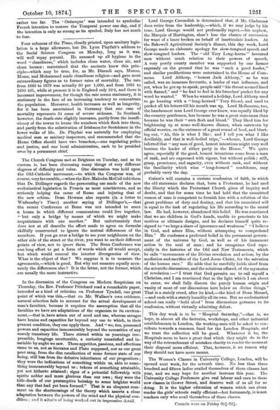Guizot's will contains a curious confession of faith, in which
the old statesman declares that, born a Protestant, he had used the liberty which the Protestant Church gives of inquiry and doubt, and that for some time he had held that the unassisted reason of man is competent to furnish him with a solution of the great problems of duty and destiny, and that his unassisted will is equal to the task of regulating his life according to the moral law. He bad, however, abandoned this belief. He was convinced that we are children in God's hands, unable to penetrate to his motives or ultimate designs, and he declares himself quite re- signed to "so large a share of ignorance and weakness." "I believe in God, and adore Him, without attempting to comprehend Him." He confesses a profound belief in the permanent govern- ment of the universe by God, as well as of his immanent action in the soul of man ; and he recognises God espe- cially in the histories of the Old and New Testaments, which he calls "monuments of the Divine revelation and action, by the mediation and sacrifice of the Lord Jesus Christ, for the salvation of the human race." He adds that he carefully holds aloof from the scientific discussions, and the solutions offered, of the mysteries of revelation :—" I trust that God permits me to call myself a Christian, and I am convinced that in the light which I am about to enter, we shall fully discern the purely human origin and vanity of most of our dissensions here below on divine things." That is a stately creed, after its kind,—the kind of Dean Mansel, —and ends with a stately humility all its own. But no ecclesiastical school can really "hold aloof" from discussions germane to its confession, without virtually admitting defeat.






































 Previous page
Previous page